The
PhotoDrama of Creation
Section 3
Adam
(Mena) was Pharaoh I
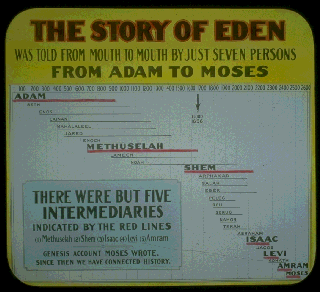
THE
ABYDOS TABLET fully agrees with Genesis and is often corroborated
by the Greek and Egyptian historians, Herodotus and Manetho.
It shows Adam as the first Pharaoh, and Noah the twentieth,
while the intermediate eighteen correspond with Genesis
with remarkable accuracy. Mena's wife was Shesh--Hebrew,
Isha--woman. Her first son was Pharaoh II.--Greek, Teta-Khent--guilty
one; Hebrew, Kanighi; Latin, Athos; English, Cain. The
tablet for Abel represents him as the non-resistant one.
THE
ABYDOS TABLET shows the same order as Moses (Genesis 4-6),
giving first the line of Cain down to Jabal, who was Kakan.
At that time, evidently, the gods and demigods began to
fill the Earth with violence. Seti's list omits the names
of these. All demigods were destroyed in the Deluge. Noah
is next in order with a regal title. But since he was
not of Cain's family, THE ABYDOS TABLET there goes back,
mentions Abel and Seth, and Seth's line just as given
in Genesis (untitled), down to Noah. These all, as Pharaohs,
have their royal ovals, but no supertitle. After Noah
(Nofru), Pharaoh XX., the line runs through his son Ham
(Chamu Chufu). Appropriately Noah's other sons are ignored;
for Shem and Japheth went to Asia and Europe, while only
Ham went to Egypt.
Thus
wonderfully is the Bible being vindicated by the very
inscriptions once supposed to contradict it.
Moses
was "learned in all the wisdom of the Egyptians."
Besides this, he was Jehovah's Prophet, and so certified
by Jesus. Although Moses lived two thousand years after
Adam, history connected up very close to his time, see
diagram.
Lines
drawn to scale, showing overlapping of Adam's 930 years,
Methuselah's 969, Shem's 600, Isaac's 180, Levi's 137,
Amram's 137 and Moses' 120. The overlapping periods were
respectively 243 years, 68 years, 50 years, 40 years,
58 years and 31 years.
The
Tower of Babel
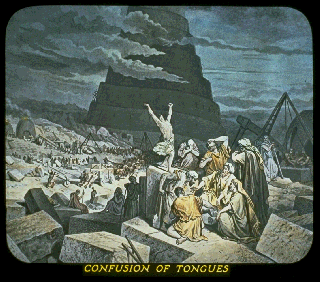
Years
after the Deluge, the world began to be populous. The
narrative handed down by Noah and his sons was more or
less forgotten, and the bow of promise lost much of its
significance. Losing confidence in God, the people began
the construction of the Tower of Babel, which was to save
them in spite of God from any flood of waters of the future.
Alas, how short-sighted, like others who possess much
worldly wisdom! The Scriptures deprecate such lack of
faith among Christians, and attempts to protect themselves
and their earthly interests, leaving God and His Plan
out of their calculations. Some today ignore God after
this manner, saying, Trust not in the Lord for the things
promised. If you wait for God to do for you, nothing will
ever be done. In other words, we are living in a day when
faith in the Divine will and in the Divine Plan and promises
seems to be on the wane.
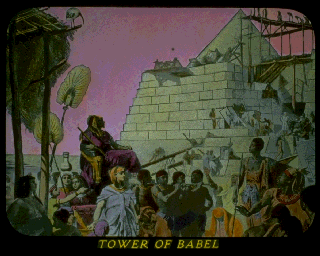
God
settled the matter by confounding the language and scattering
the people so that they could not co-operate in further
foolish undertakings. The Bible refers to this, saying,
"He hath determined the times before appointed, and
the bounds of their habitation; that they should seek
the Lord, if haply they might feel after Him, and find
Him."
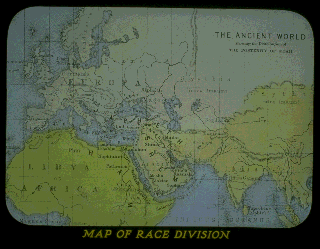
The
diversity of languages is one of the most remarkable things
in the world--an effectual barrier to prevent mankind
from combining for the accomplishment of their own purposes,
selfish or sinful. It has delayed the great Day of Wrath.
Now
the language barriers are breaking down, and we find the
tendency of humanity to re-unite. Unions and Trusts are
being built by the Rich and the Poor--each for self-protection.
The rule of kings and princes is threatened by the growth
of common language and intelligence in the masses. Had
these barriers been removed two thousand years ago, similar
results would have come too soon, according to the divine
purpose which is shaping Earth's affairs in preparation
for Messiah's Kingdom, which will bless the entire human
family.
Abraham
God's Friend
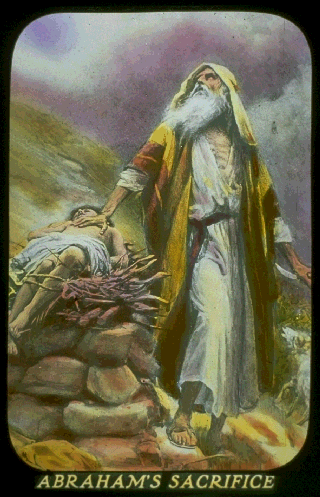
Abraham
became the friend of God by his manifestation of faith,
when in response to God's invitation he left his own country
and wandered in Canaan. By this obedience he became heir
of the Promise, "In thee and in thy Seed shall all
the families of the Earth be blessed." St. Paul explains
(Galatians 4:23,24.) that Abraham's wife represented this
Covenant, or Promise. Sarah's barrenness corresponded
to the long-deferred coming of Christ in fulfilment of
the Promise. Isaac typified Messiah, the Heir of the Promise.
Isaac's bride, Rebecca, typified the Elect Church, the
Bride of Christ and His joint-heir in the Promise.
St.
Paul says that Hagar typified the Law Covenant made with
Israel at Mt. Sinai, and that the nation of Israel was
typified in Ishmael. (Galatians 4:25.) As Hagar and Ishmael
were cast off when Isaac was born, and had almost perished,
so the Jewish people have been cast off from Divine favor
for eighteen centuries, and today are nearly famished.
As the angel of God pointed to the fountain of water,
and Ishmael was revived, so God's message now is pointing
the Jews to a spring of water; their Zionistic hopes are
reviving.
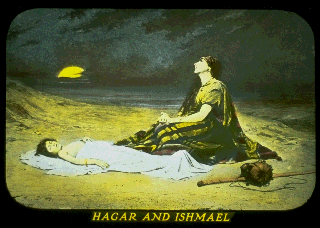
The
sacrifice of Isaac typified the sacrifice of Christ, necessary
in order for Him to become the Spiritual Seed of Abraham
with power to bless the world.
The
servant sent to call Rebecca, the bride of Isaac, is beautifully
explained to represent the work of the Holy Spirit in
calling the Church to become the Bride of Christ and His
associate in the great work of blessing Israel and all
the families of the Earth.--Acts 3:19-26.
Rebecca's
return with Eliezer represents the Church's journey during
this Gospel Age to meet Christ, the Bridegroom who will
receive her at His Second Advent. Abraham typified Jehovah
God, through whose promise the blessing of all the families
of Earth will come. This promise has been the hope of
Israel for thirty-five centuries.--Galatians 3:29.
The
Destruction of Sodom
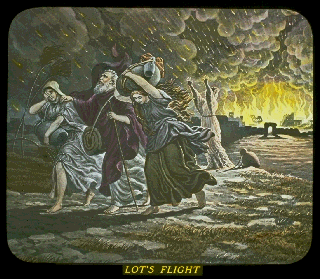
The
Sodomites possessed a very rich valley and comparatively
avoided that feature of the curse declaring that bread
must be won by sweat of face. These conditions were conducive
to the selfishness and sin which the Bible charges--"pride,
fulness of bread and abundance of idleness; neither did
she strengthen the hand of the poor and the needy; and
they committed abominations; therefore I took them away
as I saw good."--Ezekiel 16:49,50.
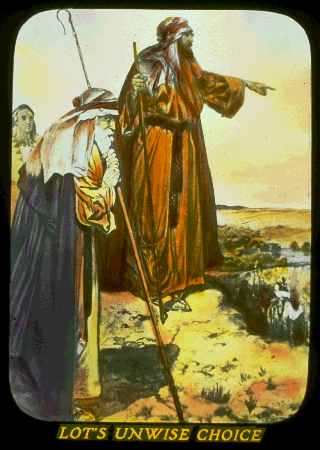
God
saw good to make the destruction of the Sodomites an example
of the fate of sinners--death, not everlasting torture,
St. Jude says. Jesus declares, "Fire came down from
God out of heaven and destroyed them all."--Luke
17:29.
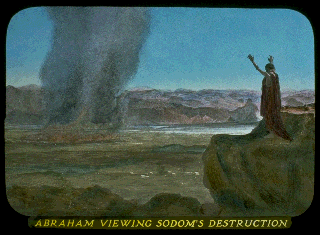
But
the Bible teaches that the Sodomites are not hopelessly
destroyed--that God's mercy through Christ includes the
Sodomites, sinners though they were. Jesus Himself, as
well as the Prophet Ezekiel, declares that at His Second
Coming in His Messianic Kingdom He will give a trial,
or judgment, to the world in general, to all who do not
have an opportunity in the present life. The Sodomites
will then have opportunity to hear of God's grace, to
accept and rejoice in it.
Jesus
declared that in that glorious Epoch the condition of
the Sodomites will be more tolerable than that of the
people to whom He preached at His First Advent. The reason
for this He explains, saying that if the Sodomites had
been granted the same opportunity afforded the people
of Chorazin, Bethsaida and Capernaum, they would have
repented in sackcloth and ashes; wherefore, in the future
testing time, "it will be more tolerable for them"
than for people who heard and rejected the Message.--Matthew
10:15; 11:21-24.
Ezekiel's
prophecy (16:49-61) is most explicit. It declares Restitution
and blessing for Israel, and incidentally mentions that
the Sodomites will receive favor from God at the same
time--under the New Covenant, under Messiah's Kingdom.
"There's a wideness in God's mercy, like the wideness
of the sea."
Photo- Lot and Daughters
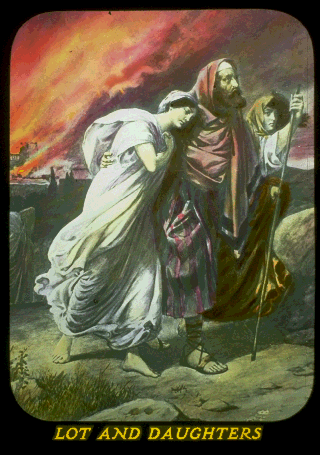
Melchisedec,
Priest and King
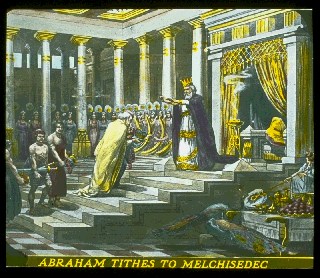
Melchisedec
was a priest of God, and at the same time King of Salem
(peace). Abraham acknowledged him and paid him tithes.
God prophetically declared through the Psalmist, that
Messiah would be a Priest of the Melchisedec order, forever.--Psalm
110:4.
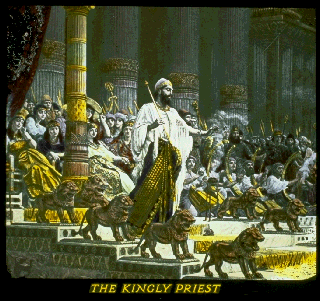
The
Jews overlooked this prophecy and thought that everything
of a priestly character in connection with God's Plan
would be fulfilled through the Aaronic priesthood, which
was merely typical. Their expectancy of the Messianic
Kingdom and glory blinded them to His work as a sin-atoning
Priest.
They
saw not that Messiah is to be one of many members. Jesus
is the Head and the Elect Church the Body of the Melchisedec
Priest. Christians are deeply interested in the Messianic
Reign; also in the fact that to become members of that
Royal Priesthood means a participation with Jesus in the
sacrifice of earthly life, as St. Paul exhorts, in Romans
12:1.
The
declaration that Melchisedec was without father or mother,
without beginning of days or end of years, has puzzled
Bible students until recently. The interpretation is now
quite satisfactory and simple: Melchisedec was without
father or mother in the priesthood. He did not inherit
this priesthood. He was without beginning of days and
years in respect to his office, in that no record was
made when his priesthood began, nor any provision made
for a successor. In these respects he typified Messiah.--Hebrews
7:1-4.
Melchisedec
is supposed to have been one of the Shepherd Kings who
invaded Egypt and built the Great Pyramid, covering twelve
acres, known for ages as one of the Seven Wonders of the
world--about 2170 B.C. Astronomers tell that its measurements
indicate the length of the year, the weight of the Earth,
the distance to the sun, etc. Its interior passages represent
human history--Downward, the course of sin and death;
Upward, the Law Age, the Gospel Age, the Kingdom glory
of the Church, and Human Restitution.
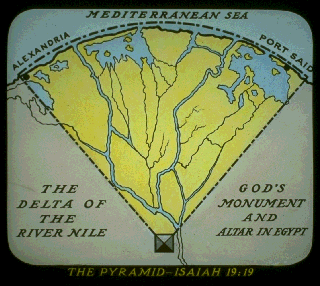
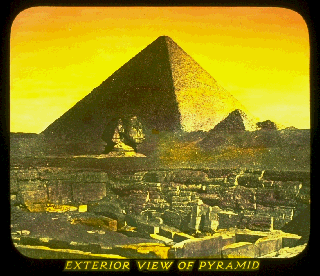
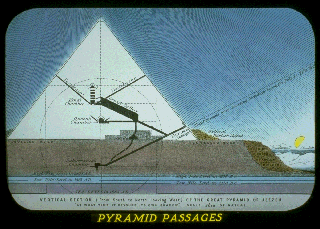
Job's
Adversity and Restitution
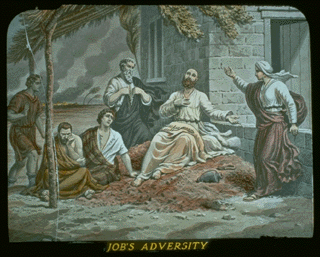
The
story of Job, Prophet of Uz, a contemporary of Abraham
and Melchisedec, is full of interest to Bible students.
Not only the facts, but their typical significance, interests
us, when we learn that Job's experiences represented the
fall and rising again of humanity.
Job
was wealthy, honored and prosperous. Suddenly disaster
came upon him. A bolt of lightning struck the house where
his sons and daughters were having a birthday party. They
were all killed. Then he lost his sheep, asses, goats,
camels and herds. Under the stress, he lost his health
and broke out with boils from head to foot. Next he lost
his friends, who declared that all this meant his utter
repudiation by God. Finally, his wife turned against him
and said, "You are cursed of God; I wish you would
die!" Poor Job wished the same and prayed, "O
that Thou wouldst hide me in Sheol [the tomb] until Thy
wrath be past; that Thou wouldst appoint me a set time
and [in resurrection] remember me." (Job 14:13.)
Messiah will fulfil this prophecy.
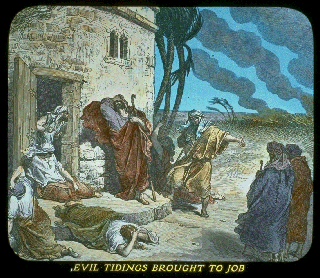
All
of this loss of health, strength, friends and wealth taught
Job valuable lessons. Similarly, poor humanity is learning
important lessons of its need of Divine care.
Under
God's providence Job was restored to prosperity, health,
etc. He got back just as many children, twice as many
oxen, sheep, camels and asses. Bible students tell us
that it ultimately will be so with humanity, according
to the Bible; that the curse of sin and death will be
removed--that instead the blessing of God will flow down
upon the human family for a thousand years, giving back
life to all who have gone down into death, and multiplying
the blessings of the Earth more than double. This lesson
is further illustrated in Israel's Jubilee Year, when
all debts were canceled and the people returned to their
original possessions. (Leviticus 25:13.) This typed the
period referred to as the "Times of Restitution."--Acts
3:19-23.
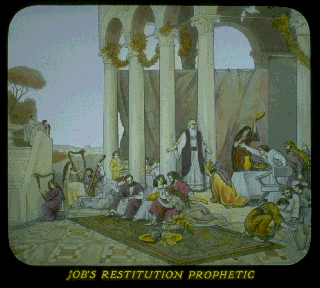
Seeking
a Bride for Isaac
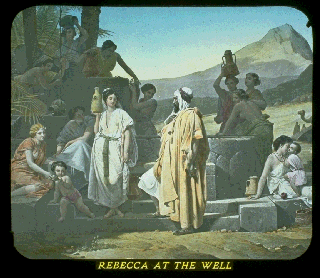
Bible
students seem well agreed that Isaac represents Christ.
As Abraham gave his son Isaac, in whom centered the promises,
to be sacrificed, so the Heavenly Father gave His Son,
Jesus, to be the Sin-Offering for Adam and his race, and
received Him again from the dead, as Abraham figuratively
received Isaac.--Hebrews 11:17-19.
Isaac's
bride, Rebecca, typified the Church of Christ, which is
to become His Bride in the resurrection, at His Second
Coming. The correspondencies are remarkable. If Isaac
represented Jesus, then Abraham would represent the Heavenly
Father, and Eliezer, the servant, sent to get the bride,
would typify the work of the Holy Spirit, the Spirit of
Truth.
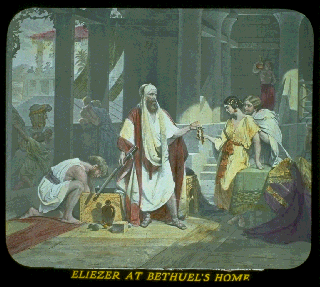
The
custom in olden times respecting marriage differed from
the custom of our day. God evidently arranged that Jewish
customs should illustrate spiritual things. Thus, instead
of Isaac's seeking a bride, Abraham sought a bride for
him, sending by Eliezer. Thus the picture is complete,
as Jesus declared, "No man can come unto Me except
the Father which hath sent Me draw him"--invite him.--John
6:44.
As
Rebecca was found with the sheep, watering them, so those
called to be the Bride of Christ are usually found, not
in fellowship with wolves, but with the Lord's sheep.
Moreover, Rebecca and the sheep were found at the well,
symbolically representing the desire of the Little Flock
class for the Water of Life--the well representing the
Bible. Rebecca
was found serving water to the flock, representing well
those whom Jesus would select for His Bride class. He
is seeking, not for those who would lord it over the sheep,
but those who feed, refresh and serve them.
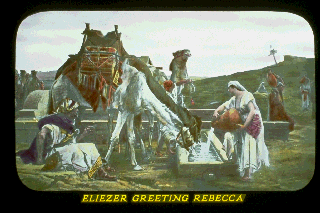
The
blessing upon Rebecca was, "Be thou the mother of
thousands of millions." (Genesis 24:60.) To some
Bible students this implies that the Church of Christ
will mother in regeneration the millions of Adam's race,
as the glorified Redeemer will be their "Everlasting
Father."--Isaiah 9:6.
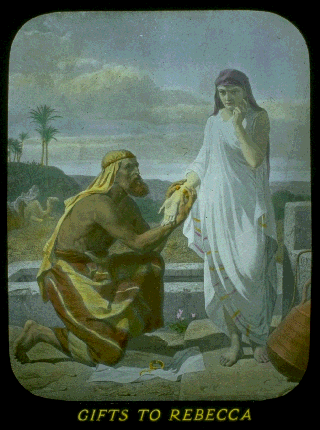
Jacob's
Ladder Dream
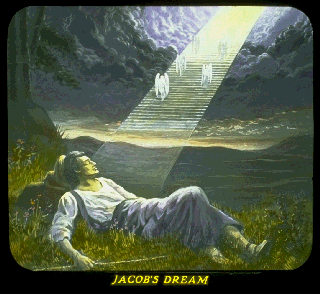
Whatever
uninspired writers have said in condemnation of Jacob,
the inspired writers of the Bible say nothing in special
condemnation, but much in his praise. His faith was specially
commended.
Jacob
was the acknowledged heir of the great Covenant God made
with his grandfather Abraham. This promise was considered
so important, and faith in it so necessary, that God subsequently
confirmed it by His oath. Divine Wisdom indicated beforehand
that the blessing would not come through Ishmael, but
through Isaac.--Genesis 21:12.
St.
Paul states that this Divine decision was made before
either Jacob or Esau had done anything bearing upon the
choice. God simply foreordained that the blessing should
come through Abraham, Isaac, Jacob, and later through
Jacob's family, the children of Israel.--Romans 9:11,12.
Esau
loved pleasure and sport. Jacob, his twin brother, born
a moment later, loved the Abrahamic Promise, and counted
all earthly possessions as nothing in comparison to the
gaining of that prize. Both men were hungry one day; Jacob
had prepared himself a feast, but instead of giving one
half to his brother, he offered him the whole of it in
exchange for his inheritance in the Promise made to Abraham.
Esau gladly accepted, esteeming the food more precious
than a promise which seemed likely never to be fulfilled.--Genesis
25:31-34.
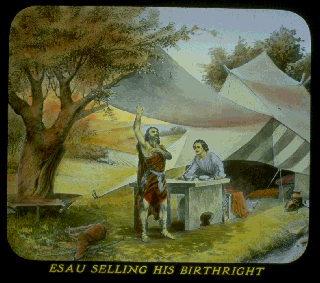
Jacob's
mother, knowing Esau's lack of character, concluded that
Jacob, having purchased the birthright, might properly
impersonate Esau and obtain the blessing. She knew that
it would mean to him loss of home and risk of life. Fleeing
from home Jacob lay down at night by the way, and had
the dream of a ladder reaching from his headstone clear
up to Heaven, with angels ascending and descending. The
dream represented the fulfilment of the Abrahamic Covenant,
in which Jacob was deeply interested, the reestablishment
of peace and fellowship between Heaven and Earth.
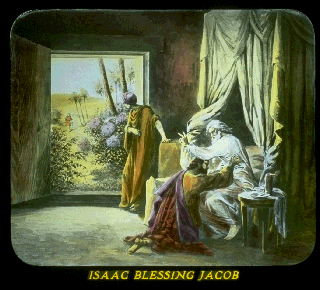
Joseph's
Coat Identified
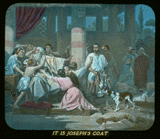
Jacob
had become a patriarch, the father of twelve sons, the
younger two of whom were Joseph and Benjamin. The elder
ten kept the flocks. Joseph went to them as his father's
messenger to learn of their welfare, and to take them
delicacies. His brethren hated him through jealousy, sold
him into slavery in Egypt, and took his elegant coat of
many colors, bedraggled it in the blood of a kid and the
dust and brought it to their father. Jacob identified
it as Joseph's; and heart-broken he cried bitterly, "I
will mourn for my son Joseph until I join him in Sheol."
(Genesis 37:35.) Sheol is the Hebrew word for tomb.
This
is the first use of the word Sheol in the Bible. Sheol
is the only word translated hell in the Old Testament,
Common Version. All scholars now admit it really signifies
the tomb, the death-state. Jacob did not think of his
beloved son as having gone to a Sheol of eternal torture,
nor did he have the thought of joining him there. Jacob
knew of no such place as Dante and others describe.
The
explanation is simple. In old English literature the words
"hell," "grave" and "pit"
were used interchangeably, as in the translation of the
Old Testament. Sheol is translated grave and pit more
times than it is translated hell in our Common Version.
Its equivalent in New Testament Greek is Hades, also signifying
the tomb, the grave, as all scholars agree. Jesus was
in Hades, Sheol, but was raised the third day by Divine
Power, from the tomb, the death condition.
The
translators of the Revised Version Bible refused to translate
these words, Sheol and Hades, by our English word Hell,
because the gradual change of language has attached a
totally different meaning from what it originally had--the
grave. See marginal readings of Psalms 55:15; 86:13.
The
learned translators, however, could not agree to render
these words grave and tomb, and left them untranslated.
Compare versions and margin of Isaiah 14:9,11.
"My
Gray Hairs to Sheol"
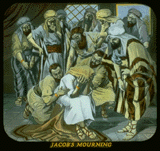
Joseph,
sold into slavery in Egypt, was under Divine supervision.
His trials and difficulties worked for his development
and faith. God ultimately honored him in Egypt with a
position second only to Pharaoh. In harmony with his dream,
there were seven years of plenty, and then seven years
of drought and famine. Acting under the guidance of his
dream, as the king's agent, Joseph stored up wheat enough
in the first seven years to carry the people over the
famine. Thus Joseph was their savior--life-giver.
Joseph
was a type of Jesus who, rejected by His brethren, the
Jewish nation, was exalted by the Heavenly Father to be
next to Himself in glory and power. Joseph was the life-
preserver, bread-giver, to the Egyptians. Jesus is yet
to be the life-preserver of the world of mankind during
His reign, giving the willing and obedient the Bread of
everlasting life.
The
famine affected Jacob's family. The ten sons went to Egypt
to buy wheat, and knew not Joseph as Pharaoh's prince.
Joseph asked if they were not spies, and inquired about
their family matters. Then he gave them wheat, telling
them that the famine would continue, and they would need
more wheat, but that if they came again, and hoped to
receive it, their younger brother Benjamin must come with
them to prove their story. Benjamin was Joseph's full
brother.
When
the time came to journey to Egypt for more wheat, Jacob
refused to let Benjamin go, until the others refused to
go without him. He then said, Take the lad; but if you
do not bring him back to me alive, it will mean my death;
it will bring down my gray hairs with sorrow to Sheol--the
grave.
This
is the second occurrence in the Bible of the word Sheol,
which really signifies the tomb, but is mistranslated
hell thirty-one times in our Common Version. It is the
only word rendered hell in the Bible for 4,150 years after
Adam's fall. Hades is the New Testament equivalent for
Sheol. See St. Peter's quotation of Psalm 16:10 in Acts
2:27.
|
